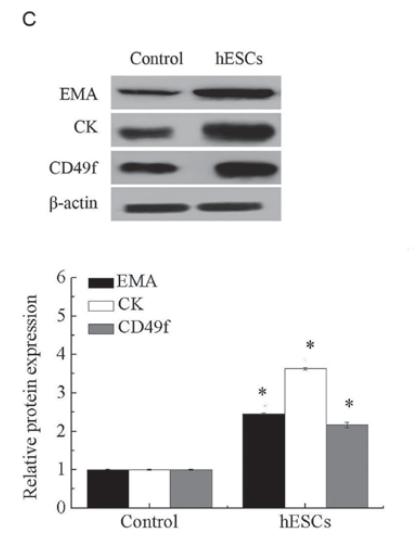CK1 Antibody - #BF0141
| Product: | CK1 Antibody |
| Catalog: | BF0141 |
| Description: | Mouse monoclonal antibody to CK1 |
| Application: | WB IHC ELISA |
| Cited expt.: | WB |
| Reactivity: | Human |
| Mol.Wt.: | 39kDa; 39kD(Calculated). |
| Uniprot: | P48729 |
| RRID: | AB_2833579 |
Product Info
*The optimal dilutions should be determined by the end user. For optimal experimental results, antibody reuse is not recommended.
*Tips:
WB: For western blot detection of denatured protein samples. IHC: For immunohistochemical detection of paraffin sections (IHC-p) or frozen sections (IHC-f) of tissue samples. IF/ICC: For immunofluorescence detection of cell samples. ELISA(peptide): For ELISA detection of antigenic peptide.
Cite Format: Affinity Biosciences Cat# BF0141, RRID:AB_2833579.
Fold/Unfold
Casein kinase 1 alpha 1; Casein kinase I isoform alpha; CK1; CK1A; CKI alpha; CKI-alpha; CKIa; Clock regulator kinase; Csnk1a1; Down regulated in lung cancer; HLCDGP1; KC1A_HUMAN; PRO2975;
Immunogens
Purified recombinant fragment of human CK1 expressed in E. Coli.
- P48729 KC1A_HUMAN:
- Protein BLAST With
- NCBI/
- ExPASy/
- Uniprot
MASSSGSKAEFIVGGKYKLVRKIGSGSFGDIYLAINITNGEEVAVKLESQKARHPQLLYESKLYKILQGGVGIPHIRWYGQEKDYNVLVMDLLGPSLEDLFNFCSRRFTMKTVLMLADQMISRIEYVHTKNFIHRDIKPDNFLMGIGRHCNKLFLIDFGLAKKYRDNRTRQHIPYREDKNLTGTARYASINAHLGIEQSRRDDMESLGYVLMYFNRTSLPWQGLKAATKKQKYEKISEKKMSTPVEVLCKGFPAEFAMYLNYCRGLRFEEAPDYMYLRQLFRILFRTLNHQYDYTFDWTMLKQKAAQQAASSSGQGQQAQTPTGKQTDKTKSNMKGF
Research Backgrounds
Casein kinases are operationally defined by their preferential utilization of acidic proteins such as caseins as substrates. It can phosphorylate a large number of proteins. Participates in Wnt signaling. Phosphorylates CTNNB1 at 'Ser-45'. May phosphorylate PER1 and PER2. May play a role in segregating chromosomes during mitosis. May play a role in keratin cytoskeleton disassembly and thereby, it may regulate epithelial cell migration.
Cytoplasm. Cytoplasm>Cytoskeleton>Microtubule organizing center>Centrosome. Chromosome>Centromere>Kinetochore. Nucleus speckle. Cytoplasm>Cytoskeleton>Cilium basal body.
Note: Localizes to the centrosome in interphase cells, and to kinetochore fibers during mitosis. Also recruited to the keratin cytoskeleton (PubMed:23902688).
Belongs to the protein kinase superfamily. CK1 Ser/Thr protein kinase family. Casein kinase I subfamily.
Research Fields
· Environmental Information Processing > Signal transduction > Wnt signaling pathway. (View pathway)
· Environmental Information Processing > Signal transduction > Hedgehog signaling pathway. (View pathway)
· Human Diseases > Infectious diseases: Viral > Human papillomavirus infection.
· Human Diseases > Cancers: Specific types > Breast cancer. (View pathway)
· Human Diseases > Cancers: Specific types > Hepatocellular carcinoma. (View pathway)
· Human Diseases > Cancers: Specific types > Gastric cancer. (View pathway)
References
Application: WB Species: rat Sample: EnSCs
Restrictive clause
Affinity Biosciences tests all products strictly. Citations are provided as a resource for additional applications that have not been validated by Affinity Biosciences. Please choose the appropriate format for each application and consult Materials and Methods sections for additional details about the use of any product in these publications.
For Research Use Only.
Not for use in diagnostic or therapeutic procedures. Not for resale. Not for distribution without written consent. Affinity Biosciences will not be held responsible for patent infringement or other violations that may occur with the use of our products. Affinity Biosciences, Affinity Biosciences Logo and all other trademarks are the property of Affinity Biosciences LTD.

